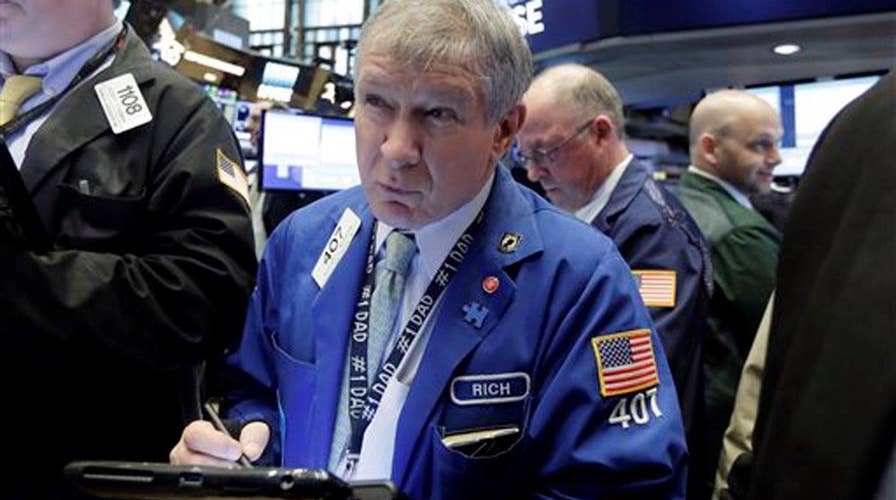US economy shows near-zero level of growth for 2016
Rep. Kevin Brady, chairman of the House Committee on Ways and Means, provides insight on 'America's News HQ'
Bill Clinton rode into office 24 years ago on the campaign mantra, ‘It’s the economy, stupid’ – and apparently, it still is.
In an election where dim economic prospects have fueled the campaigns of both Democrat Bernie Sanders and Republican Donald Trump, a new Fox News poll shows the economy still is far and away the top priority for voters. And faced with flashing warning signs of tepid growth, barely rising wages and factors that signal an even further slowdown, what would a President Trump or Clinton or Sanders do about it?
The proposals span the gamut: Trump wants big tax cuts and tariffs on trading partners. Sanders wants a hike in the minimum wage and free college tuition. Hillary Clinton wants more infrastructure spending.
And each candidate has taken the others to task on their positions and plans.
Clinton economic adviser Gene Sperling recently warned that if Trump was elected he would put the entire financial system at risk. That was after Trump said he could reduce the national debt by getting the government to pay back less than it has borrowed.
Trump, though, has slammed his likely Democratic rival over trade policies, including the North American Free Trade Agreement that Clinton’s husband signed into law in 1993.
"It has cleaned out our country of jobs," Trump told Fox News on Friday.
Trump says he’d be the “greatest jobs producer in history” by slapping tariffs on Mexico, China and other trade partners.
That's a big shift for Republicans.
“The lines have been crossed,” Carroll Doherty, director of political research at Pew Research Center, said. “The Republicans were always known as the party of free trade and now they are less supportive of free trade than Democrats.”
The stakes are high, as the next president is likely to face a lingering economic challenge all in the wake of the last recession.
A Wall Street Journal survey of economists earlier this month showed an elevated risk (about 20 percent) of another U.S. recession in the next year. One of those economists, the National Association of Manufacturers’ Chad Moutray, cited: “Decelerating employment growth, growing uncertainty and sputtering GDP growth.”
Income inequality continues to strike a deep divide between the haves and have-nots, which the candidates also have seized on.
Clinton pledges to enact the “Buffett Rule” – a basic principle that ensures no household making more than $1 million annually should pay a smaller share of their income in taxes than a middle-class family pays.
Clinton also promises to strip tax benefits from U.S. companies that move jobs to foreign countries to get a more favorable rate. And she says she’ll help small businesses by expanding access to capital and vows to invest $350 billion in secondary education.
Clinton supports as well raising the federal minimum wage to at least $12 – currently, it’s at $7.25 for covered nonexempt employees. Clinton has also shown support for the Fight for $15 campaign which pushes for even higher minimum wages in individual states.
It’s a fight Sanders has taken on since the start of his campaign. And he's accused Clinton of being late to the party. At a CNN debate in April, Sanders mocked Clinton’s declaration of support: “What has happened is that history has outpaced Secretary Clinton.”
Sanders repeatedly has described tackling income inequality as the hallmark of his campaign. He also has vowed to break up big banks, cap credit card rates at 15 percent and limit ways some in the financial industry have been able to monetarily benefit from taxpayer bailouts.
Trump, meanwhile, takes the opposite tack. Trump says dismantling the Dodd-Frank financial regulatory overhaul would be one of his top priorities. He’s also said he’d boot out Federal Reserve Chairwoman Janet Yellen.
While the candidates push for more economic changes, there are bright spots.
When President Obama took office, the economy was losing 800,000 jobs a month. The unemployment rate has since fallen dramatically, from 10 percent to 5 percent. During Obama’s two terms, the private sector has added jobs for 73 straight months.
Still, hard economic realities face the country, putting pressure on the next Oval Office occupant to engineer a jump-start.
The economy grew at its weakest quarterly pace in two years between January and March -- 0.5 percent -- as consumers spent cautiously. Businesses cut back on investments to levels not seen since the financial crisis of 2008. And there was a massive stock market sell-off at the start of the year which eroded consumer confidence.
And while the budget deficit -- the federal government's annual shortfall -- has shrunk by nearly $1 trillion, Washington continues to spend far more than it earns, swelling the national debt beyond $19 trillion. It's a factor that could increasingly limit the government's ability to spend its way out of an economic downturn.
Should the country find itself in another recession, James Pethokoukis, an expert at the conservative American Enterprise Institute, says a Trump response would likely be based on a “truly massive tax cut” -- and more.
“He also likes to do infrastructure. Fantastic, he can throw in some infrastructure in there as well. Doesn’t care about the debt? Who cares? Fine. So we have a massive tax cut, maybe massive infrastructure spending,” Pethokoukis said. “A Donald Trump presidency during a recession – assuming that his trade conflict doesn’t cause the recession – might just be like the Democratic dream president.”











































